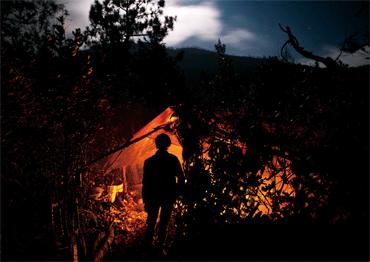To preserve the local hunting culture, Dulong elder and former Gongshan County chief Gao Derong advocated for limited traditional hunts, Meng Zisung explained. However, wildlife protection authorities rejected the proposal.
“He also proposed setting aside one mountain for hunting performances to attract tourists and allow outsiders to learn about our traditional hunting culture, but authorities rejected that idea too,” Meng told the reporter.
“My generation still has detailed knowledge about our hunting traditions, but the next generation knows nothing about it. I’ve hunted in the mountain forests with my grandpa since I was a child and learned that a successful hunt is collaborative and involves energy exchanges between all elements in nature.”
“Hunting is banned, but in many ethnic regions in Yunnan, hunting is a livelihood backed by beliefs. During our research, we discovered an intact system of harmonious coexistence between human, plants and wildlife animals,” said Shen Dingfang, founder of Mengnanshe, a Kunming-based NGO engaged in cultural conservation and community development.
Shen told the reporter in December 2021 that some groups in Yunnan believe that hunting more than one four-legged animal a day or a pregnant animal will bring misfortune to the hunter and his family.
“This philosophy of modest utilization of natural resources helps locals strike a balance with wildlife and the natural environment, sustaining the reproduction of wildlife,” Shen said. “Yet it should be clarified whether hunting, as a kind of livelihood or culture, should be passed down. Perceptions have changed, and the complete system for traditional hunting is unlikely to remain intact.”
“Dulongjiang is within a national nature reserve, and all hunting activities are prohibited. I hope that some hunting activities are restored in an orderly manner under the supervision of authorities, mainly to promote tourism in the Dulong region, and is also a way to protect the traditional culture of the Dulong people,” Yang Jiangling told the reporter in mid-January.
Some disagree. “Personally, I believe hunting and slash-and-burn agriculture were forced choices under extremely primitive living conditions,” Duan Jianhui said. “Thanks to our country’s poverty alleviation efforts, and as long as you have enough food and daily necessities, who wants to risk going on hunts in the mountains? Many local ethnic people still keep a crossbow at home, purely as decoration.”
In Du Xingmei’s paper, she concluded that “completely different from all the production systems based on transforming nature, the Dulong people’s livelihood reflects ecological knowledge and wisdom with a complete system of energy exchange and material circulation.”
Unless a balance is struck between conservation of nature and culture, this valuable wisdom will likely fade into history. “Each year as winter comes, we used to set off on hunts deep in the forests on sunny days,” Meng said, looking down at the bear tooth talisman hanging around his neck. “This tooth is from a bear that my grandfather, an experienced Dulong hunter, killed when he was young. I’ve had it on me for over 30 years. It’s precious and carries my grandfather’s best wishes for me and my family.”
“We do not enjoy a wealthy or modern lifestyle in this remote borderland area, but our hunting culture should be preserved and passed down to future generations to maintain our connection with nature,” Meng said.

 Old Version
Old Version



